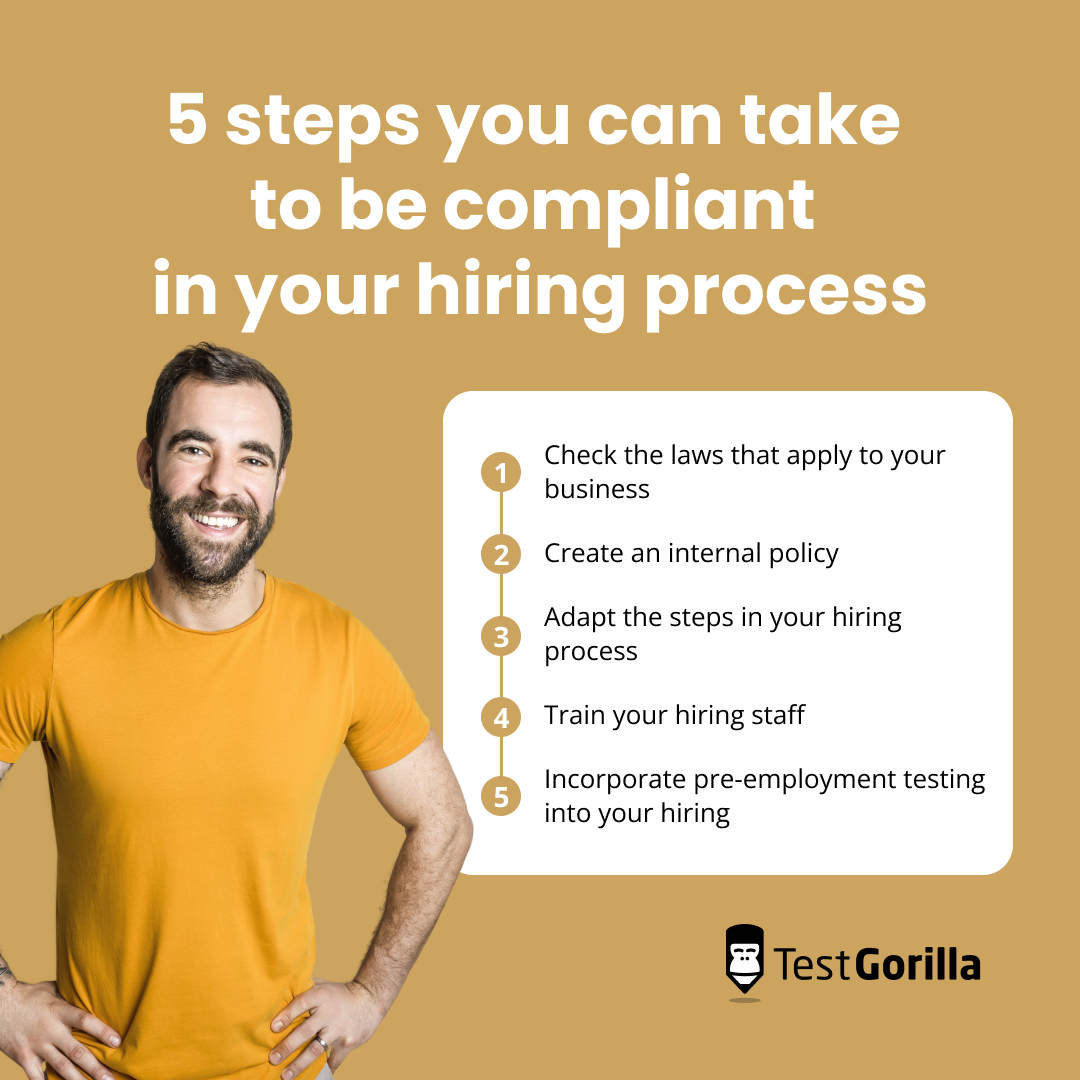Ban the Box laws are an essential aspect of fair chance hiring. They ensure equal employment opportunities for candidates while contributing to diversity in the workplace. However, varying federal, local, and city rules make compliance tricky.
This article looks closely at Ban the Box laws that may apply to your business. We also explain adverse action and the steps you can take to ensure your HR department uses compliant hiring practices.
Table of contents
What does a Ban the Box law do?
Job applications traditionally had yes-or-no checkboxes asking if candidates had criminal convictions. A Ban the Box law prohibits you from asking candidates to disclose criminal convictions in their initial job applications.
Most Ban the Box laws require employers to wait until after an interview or conditional offer of employment before inquiring about candidates’s criminal histories or running background checks.
Hawaii started the Ban the Box movement in 1998, becoming the first state to pass these laws. Today, multiple federal, state, and local laws prohibit employers from asking about criminal records on job applications. Even where laws don’t apply, some organizations support the movement by voluntarily implementing Ban the Box policies.
Ban the Box prompts you to consider applicants’ skills and qualifications rather than automatically disqualifying them based on criminal convictions.
This shift addresses the systemic challenges individuals with criminal histories face when searching for a job, promoting equality of opportunity. Adopting Ban the Box practices can widen your hiring pool and increase diversity in your workforce.
Some Ban the Box laws go beyond requiring you to wait to request criminal records. They might obligate you to consider only certain records or follow specific steps when taking adverse action.
Recommended reading: 37 states with Ban the Box laws (guide for employers)
What is adverse action, and how is it relevant?
In hiring, adverse action refers to any employment decision against a candidate based on their criminal record – such as rejecting their application.
You may need to follow specific steps when you take adverse action against a candidate.
If you obtained the criminal record through a consumer reporting agency, you must comply with the Fair Credit Reporting Act (FCRA). Under the FCRA, you must give the candidate:
A pre-adverse action notice
A copy of the criminal record you’re using
A standard form called “A Summary of Your Rights Under the Fair Credit Reporting Act” from the consumer reporting agency
You must then give the applicant time to respond or dispute the record before you can send them a final notice. While the FCRA doesn’t specify the amount of time, guidance suggests five days is sufficient.
You can then send the candidate a final adverse action notice that:
Tells the candidate that you rejected their application based on the report
Gives the candidate the consumer reporting agency’s information
Explains that the agency didn’t make the adverse action decision and can’t provide reasons for it
Lets them know they can challenge the decision and request a free report from the agency within 60 days
Some Ban the Box laws impose additional requirements for those taking adverse action. These requirements include providing applicants additional time to respond, giving them extra notices or information, or following alternative procedures.
For example, Washington employers must assess candidates to determine if they’re otherwise qualified for the role before disqualifying them, and there’s a seven-day waiting period in San Francisco between sending a pre-adverse action and a final adverse action.
Which companies must comply with Ban the Box laws?
When a Ban the Box law applies to your company, you must comply to avoid facing penalties, including fines and legal actions.
The federal Ban the Box law applies to public employers only. Additionally, 37 states and more than 150 cities and municipalities have Ban the Box laws that apply to public and/or private employers. You must check which laws apply to you based on your organization’s status as a public or private employer – and possibly its employee count.
Many Ban the Box laws exempt certain roles, such as childcare and security. For these roles, you can inquire about an applicant’s criminal record early in the hiring process since some convictions may prevent applicants from obtaining the required licenses for these positions.
Your organization can also voluntarily implement a Ban the Box policy, even if it’s not legally required. Several large corporations, including Target and Walmart, do this.
What does Ban the Box mean for you as an HR manager?
When a Ban the Box law applies, you must adapt your HR department’s processes accordingly to avoid penalties. You can also choose to adopt a Ban the Box policy voluntarily.
Generally, you must delay inquiring about candidates’ criminal records until later in the hiring process. You also need to adapt the timing and processes around your background checks.
5 steps you can take to be compliant in your hiring process
These five steps can help your HR department maintain compliance and promote equitable employment opportunities.
1. Check the laws that apply to your business
You must first understand your legal obligations to ensure your approach to candidates’ criminal records is compliant. Remember to check at the federal, state, and local levels, looking closely at the details of each law. Looking online, especially at the relevant Department of Labor website, is a good start.
Ask someone in your organization with employment law qualifications or experience to assist with understanding your legal obligations, if possible. Otherwise, seek advice from an attorney. Multiple laws may apply to your business. When this occurs, the rule that offers the most protection to the candidate generally applies.
2. Create an internal policy
Developing an internal policy is essential for outlining your organization’s approach to handling criminal records during the hiring process and applying it consistently. You can tailor your policy to comply with any applicable Ban the Box laws and to suit your organization’s needs.
Your policy should address:
When hiring managers can ask candidates about criminal convictions or conduct background checks – for example, after an interview or conditional employment offer.
Which types of criminal records to consider. Some Ban the Box laws put time limits on the records you can take into account or prevent you from considering convictions that don’t directly relate to the role’s duties.
The Equal Opportunity Employment Commission (EEOC) says that records should be “job-related…and consistent with business necessity.”
A tech company hiring a software developer shouldn’t consider an applicant’s dated conviction for possessing a small amount of cannabis. An offense of this nature, especially one that occurred years ago, isn’t relevant to the role or company’s functions.
How to consider these records. The EEOC recommends identifying the essential requirements of the role and any specific offenses that may make a candidate unsuitable for the role. For example, a previous conviction for serious fraud would probably disqualify a candidate from a position involving other people’s finances.
How to conduct an individualized assessment. This requires hiring managers to consider an applicant’s criminal record in the context of other factors, such as the length of time since conviction, the seriousness of the offense, and the steps the candidate has taken to rehabilitate. For instance, you might give less weight to convictions for minor offenses that happened years ago.
The process for taking adverse action against a candidate based on their criminal record. You can set out the steps and timeframes for providing applicants with pre-adverse action and final notices. This section must comply with the FCRA or applicable Ban the Box law where relevant.
3. Adapt the steps in your hiring process
Once you understand your obligations, you can adapt your hiring process accordingly. Your first step should be removing any questions about criminal records from job applications. You may also need to review and revise your job descriptions, interview questions, and other hiring forms to ensure compliance.
4. Train your hiring staff
Ensure your hiring team understands their legal obligations and the organization’s criminal record inquiries policy. Provide them with training on broader topics like non-discrimination and fair hiring practices, as well as specific Ban the Box rules or policies that apply.
Educating your team will help them know when they can ask about candidates’ criminal records and the process for doing so. You can also train them on interview and decision-making techniques focusing on applicants’ qualifications, skills, and experience. Effective training methods include role-playing activities or online video training.
5. Incorporate pre-employment testing into your hiring
Pre-employment testing supports skills-based hiring and fair hiring practices in your organization. By assessing candidates' cognitive abilities and job-related skills, you can identify the best person for the job without considering subjective factors.
Pre-employment assessments contribute to a bigger picture of a candidate’s suitability for the role. Suppose you later run a background check and discover a candidate has a criminal record. In that case, their pre-employment testing results help you consider their conviction in the context of their broader ability to do the job.
Looking for a pre-employment testing platform?
TestGorilla offers hundreds of online role-specific skills, personality, and situational judgment assessments that you can easily combine into multi-measure assessments.
Learn more: 4 Ban the Box initiatives for your next hiring campaign
Pre-employment testing can complement Ban the Box laws
Ban the Box laws promote equal access to job opportunities and foster workplace diversity. Knowing applicable Ban the Box laws is essential for HR managers. Developing a clear policy and training your hiring team on their obligations are practical steps toward compliance with these laws.
Pre-employment testing is another valuable tool for supporting fair hiring practices, including Ban the Box laws and policies.
Give TestGorilla’s free plan a go to find out how it can help your business in conducting fairer, compliant hiring.
Disclaimer
The information in this article is a general summary for informational purposes and is not intended to be legal advice. Laws are subject to constant change, and their applications vary based on your individual circumstances. You should always seek legal advice from a qualified attorney about your legal obligations as an employer. While this summary is intended to be informative, we cannot guarantee its accuracy or applicability to your situation.
Related posts
Hire the best candidates with TestGorilla
Create pre-employment assessments in minutes to screen candidates, save time, and hire the best talent.
Latest posts
The best advice in pre-employment testing, in your inbox.
No spam. Unsubscribe at any time.

Hire the best. No bias. No stress.
Our screening tests identify the best candidates and make your hiring decisions faster, easier, and bias-free.
Free resources
This checklist covers key features you should look for when choosing a skills testing platform
This resource will help you develop an onboarding checklist for new hires.
How to assess your candidates' attention to detail.
Learn how to get human resources certified through HRCI or SHRM.
Learn how you can improve the level of talent at your company.
Learn how CapitalT reduced hiring bias with online skills assessments.
Learn how to make the resume process more efficient and more effective.
Improve your hiring strategy with these 7 critical recruitment metrics.
Learn how Sukhi decreased time spent reviewing resumes by 83%!
Hire more efficiently with these hacks that 99% of recruiters aren't using.
Make a business case for diversity and inclusion initiatives with this data.


















